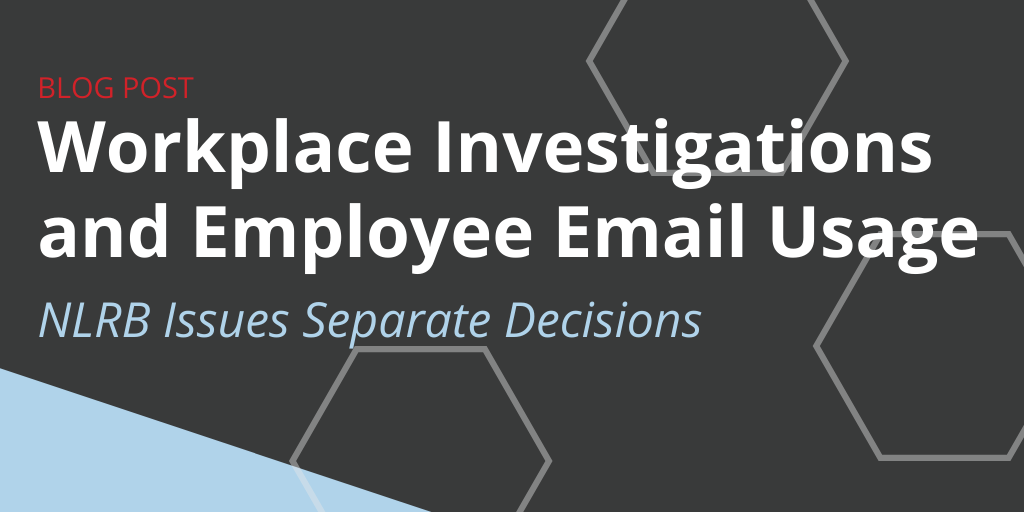LABOR LAW NEWS
NLRB Issues Decisions on Workplace Investigations, Employee Email Usage
By Kris Janisch
Published Jan. 9, 2020

Stemming from two different cases, the decisions were issued Dec. 17, 2019, and reverse previous National Labor Relations Board decisions.
The National Labor Relations Board (NLRB) last month handed down two separate decisions that will impact how employers deal with employees regarding workplace investigations and email usage.
Stemming from two different cases, the decisions were issued Dec. 17, 2019, and reversed previous NLRB decisions.
Workplace Investigations
Starting with workplace investigations, the NLRB overturned a 2015 decision and determined it is “presumptively lawful” to require confidentiality from employees during a workplace investigation.
Essentially, the NLRB said the previous decision created an undue burden for employers, who will no longer be required to prove on a case-by-case basis that an investigation’s integrity would be compromised without confidentiality, according to the NLRB.
The case in question involved a thrift store, which told workers to maintain confidentiality about investigations of potential misconduct.
Ultimately, the NLRB decided that “preserving the integrity of an investigation outweighed employee Section 7 rights, contrary to both Supreme Court and Board precedent.”
In overturning the previous decision, the NLRB also noted the new standards are more in line with federal and Equal Employment Opportunity Commission guidance.
Email Usage Restricted
Meanwhile, the NLRB on Dec. 17, 2019, also issued a decision that reestablishes an employer’s right to restrict use of company email, so long as the business does so on a nondiscriminatory basis.
The case involved a casino, with the NLRB finding employees generally cannot use the company email system for union purposes. Employees had filed a grievance saying the employee handbook violated an earlier NLRB decision.
Overturning the 2017 decision, the NLRB said workers do not have the right to use company communications software for “non-work-related” discussion.
“Rather, employers have the right to control the use of their equipment, including their email and other IT systems, and they may lawfully exercise that right to restrict the uses to which those systems are put, provided that in doing so, they do not discriminate against union or other protected concerted communications,” according to the NLRB.
However, the NLRB also noted an exception to the decision in situations where company email is the “only reasonable means” for employees to communicate with one another about union issues.
Conclusion
As companies gear up for new 2020 laws, both NLRB decisions could be viewed as victories for employers:
- Limiting employees from discussing investigations
- Limiting email usage to business purposes only
If nothing else, employers should review their internal policies to ensure they match up with federal guidelines.
This Labor Law News Blog is intended for market awareness only, it is not to be used for legal advice or counsel.
Keep Informed
with GovDocs Labor Law News
Who is GovDocs?
GovDocs simplifies the complexity of employment law management (ELM) for large, multilocation employers across all industries. We offer a suite of innovative compliance products, including labor law postings, data software applications and other program management tools, to ease the day-to-day responsibilities of human resources, compensation, legal and finance teams.
Have less than 30 locations?
The GovDocs Poster Store simplifies the complexity of posting compliance for employers with less than 30 locations across all industries. We offer a variety of posting products to meet your labor law compliance needs, including federal and state posters; county and city poster packages; and other HR posters. Plus, when you purchase posters with GovDocs Update Service, you ensure your locations automatically receive updated posters whenever changes occur.


